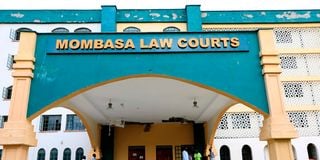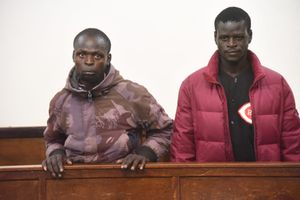
The new Mombasa Law Courts building in this picture taken on June 8, 2023.
When Abdulaziz Ali Swaleh answered a call on his late grandmother’s phone, he murmured that he had a knife in his hand and was hearing voices telling him to kill his grandmother.
Unaware, his murmur offered the caller a disturbing glimpse into his tortured thoughts—a revelation that has since become a pivotal piece of evidence in the court case that ultimately led to his guilty verdict.
Swaleh now stands on the precipice of a lengthy prison sentence after High Court in Mombasa ruled that prosecution provided sufficient evidence to prove he is guilt beyond reasonable doubt.
“I am satisfied that the prosecution proved that the deceased's death was caused by an unlawful act on the part of the accused person herein,” said Justice Ann Ong’injo in a ruling dated October 29.
However, the judge observed that her conclusion was that Swaleh was not in a proper mental state to comprehend his actions, taking into account the evidence and his mental health history.
“His actions could not have been informed by a right thinking person and, therefore, he cannot be found to have had malice aforethought. He is, therefore, guilty for having committed an unlawful act that led to the death of the deceased,” said the judge.
Swaleh was charged with the murder of his grandmother Sharifa Ali Salim on January 21, 2023, at Bondeni Estate in Mvita sub-county, Mombasa.
The prosecution called 15 witnesses to support its case.
Ms Antonina Kahindi testified in court that she had previously worked as a house help for the deceased and that sometime in December 2022, Swaleh moved in with his grandmother.
“He used to talk and laugh to himself and appeared to have a mental problem, but I was not aware if the accused received treatment for his condition,” she said.
She recalled that on the night of the incident, after they had dinner, she prepared the deceased's bedroom, and they went to sleep. The suspect slept in the sitting room.
After a while, she heard someone hitting the wall, she called the accused and asked what was happening.
“When the accused answered the phone, he told me that "Naskia sauti ikiniambia nimuuwe na niko na kisu mikononi (I hear a voice telling me to kill her, and I have a knife in my hands)”Ms Kahindi told the court.
The witness stated that she raised an alarm, prompting a response from the neighbours.
A next-door neighbour, who had been with the deceased's family on that fateful night until 9pm, confirmed to the court that he left the deceased in the company of the house help and the accused.
A postmortem report produced in court found that the deceased’s body had a fresh cut wound on the right side of the neck measuring 10cm by 2cm and an exposed cut trachea. The right carotid artery was also cut.
The court was told that the cause of death was hemorrhagic shock secondary to traumatic penetrating cut wound on the neck.
Corroborated evidence
According to the court, this evidence corroborated the evidence of the other prosecution witnesses that the deceased met her death after an attack and assault.
“There being no other evidence contradicting the medical finding on the cause of death, this court concurs with the medical evidence produced that the deceased died as a result of the unlawful act,” said Justice Ong’injo.
In his defence, Swaleh denied committing murder. He however confirmed they all had dinner with his grandmother on the fateful night and thereafter retired to bed.
“After a short while, my grandmother died, it was said that she had been cut with a knife though I cannot tell how it happened,” he said
He further defended himself that he was not mentally okay since he had been visiting rehabilitation centres and hospital for medication for mental health while in Malindi.
Swaleh said he would go to hospital for mental health treatment whenever he was in Mombasa.
“Whenever I had mental issues, I would talk on my own, hear voices telling me to jump from high buildings, laughing without cause, at times feeling possessed spiritually,” he said
However, on the day he was defending himself, he said he was feeling better, and maintained that he did not kill his grandmother.
In the end, the Judge noted that evidence shows there were three people in the deceased's house on the fateful day, hence there was no possibility of a break-in.
“When the accused answered the deceased phone, he said that he had a knife in his hand and he was hearing voices telling him to kill his grandmother. Moreover, a witness established that the murder weapon must have been a sharp object. This evidence was not controverted by the defence. Further, the accused in his testimony stated that he could hear voices telling him to do certain things,” said the judge
Justice Ong’injo argued that taking the prosecution's evidence in totality, it was her finding that the circumstances in the case form a complete chain and points to the conclusion that within all human probability, the crime was committed by the accused.
Swaleh’s father testified that his son suffered depression and had mental problems and that he had intended to admit him to a mental facility.
A letter from Coast General Teaching and Referral Hospital outlined Swaleh’s history that he has been on follow-up for schizophrenia for three years.
The report also indicated that Swaleh had been using cannabis, muguka and miraa for six years, the last use being prior to his arrest.
“Is this a possibility that at the time of the murder incident, he was not in the right mental state to understand his actions and form the intent? I do, however, acknowledge that at the time of trial, the accused had been declared to be of sound mind and fit to stand trial,” said the judge
The judge further noted that in a defence of insanity, the evidence should demonstrate that the accused was prevented, by reason of insanity, from appreciating what he was doing or from knowing that it was wrong.
“Taking the letter from the hospital and the testimony of five witnesses into consideration, I find in the affirmative. Due to the accused's mental status on account of the schizophrenia, it can be concluded that at the time of the incident, he suffered temporary insanity,” said the judge.
But the Judge still found him guilty of the offence of murder.
Swaleh is awaiting sentencing.










